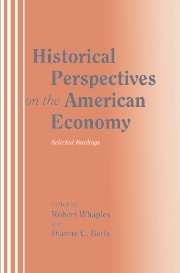Book contents
- Frontmatter
- Contents
- Acknowledgments
- Introduction to students
- Introduction to instructors
- Contributors
- I Introduction
- II Colonial and early national economy
- III Slavery and servitude
- IV The South since the Civil War
- V The rise of American industrial might
- 10 “The railroads: The first modern business enterprises, 1850s–1860s”
- 11 “Notes on the social saving controversy”
- 12 “Industrial structure and the emergence of the modern industrial corporation”
- 13 “The origins of American industrial success, 1879–1940”
- 14 “Federal policy, banking market structure, and capital mobilization in the United States, 1863–1913”
- VI Populism
- VII Women in the economy
- VIII The Great Depression
- Appendix: Basics of regression
- Glossary
- Name index
- Subject index
11 - “Notes on the social saving controversy”
Published online by Cambridge University Press: 05 June 2012
- Frontmatter
- Contents
- Acknowledgments
- Introduction to students
- Introduction to instructors
- Contributors
- I Introduction
- II Colonial and early national economy
- III Slavery and servitude
- IV The South since the Civil War
- V The rise of American industrial might
- 10 “The railroads: The first modern business enterprises, 1850s–1860s”
- 11 “Notes on the social saving controversy”
- 12 “Industrial structure and the emergence of the modern industrial corporation”
- 13 “The origins of American industrial success, 1879–1940”
- 14 “Federal policy, banking market structure, and capital mobilization in the United States, 1863–1913”
- VI Populism
- VII Women in the economy
- VIII The Great Depression
- Appendix: Basics of regression
- Glossary
- Name index
- Subject index
Summary
This paper explores a number of the unresolved issues posed by the debate on the social saving of railroads. The final section includes a brief summary of the main findings of the new economic history of transportation.
It is now more than 17 years since the first discussion of the social saving of railroads at a meeting of economic historians and more than 16 years since the first publication of a paper dealing with this question. The ensuing train of research has been substantial. Applications of the social saving approach and critiques of these applications have been set forth in at least a dozen books and in several score of journal articles and reviews. The debate, as Patrick O'Brien recently observed, has been both exciting and illuminating. Because of the rich interaction between the investigators and the critics, important aspects of the transportation revolution of the nineteenth century have been clarified.
In this paper I seek to explore a number of still unresolved issues that have been posed by the debate. The comments that follow are divided into four parts. The first part deals with the nature of the social saving model and the limits of its usefulness for historical analysis. The next part takes up an array of practical and conceptual issues that have been raised about the data and procedures actually employed by myself and other researchers in our various estimates of the social saving.
- Type
- Chapter
- Information
- Historical Perspectives on the American EconomySelected Readings, pp. 366 - 427Publisher: Cambridge University PressPrint publication year: 1995



